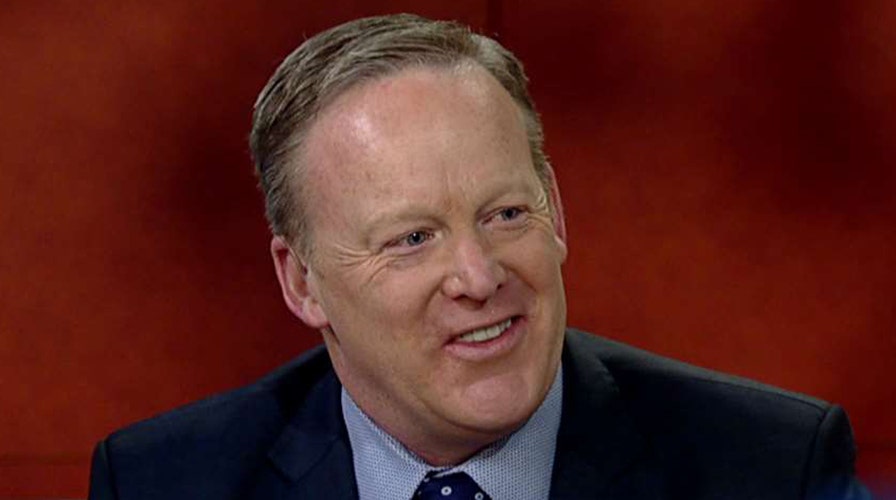Sean Spicer reflects on being named Trump's Press Secretary
Incoming White House press secretary gives his take on 'Fox & Friends'
With less than a month until the inauguration, Donald Trump is not waiting to exert his influence on everything from government contract negotiations to international affairs – taking a historically active role for a president-elect while the incumbent is still in office.
Trump’s involvement in seeking changes early to U.S. policy could be seen in the dramatic and rapid-fire developments at the United Nations this week regarding a controversial resolution condemning Israeli settlement construction in the West Bank and East Jerusalem.
Reuters reported the Israeli government asked Trump to apply pressure on the Obama administration and the United Nations to prevent a Security Council vote after failing to persuade the administration to veto. Trump put out a statement Thursday condemning the resolution and later reportedly spoke to Egyptian President Abdel Fattah el-Sisi – who abruptly postponed the vote on the measure, which his country had proposed.
Nevertheless, the Security Council resumed deliberations and passed the measure on Friday, with the help of an abstention from the U.S. Republicans blasted the U.S. stance as "shameful," while Trump tweeted: "As to the U.N., things will be different after Jan. 20th."
It wasn't the outcome Trump hoped for at the U.N. But his attempt to help the Israelis came after he ventured into difficult diplomatic territory elsewhere. He had a protocol-defying phone call with Taiwan’s president, while later blasting China for seizing a U.S. underwater drone, which China later returned. The Obama administration was actively involved in dealing with China over the drone, but Trump’s commentary made him more than a sideline player.
The president-elect, meanwhile, already is trying to apply the “art of the deal” to government contract talks. He hosted the top executives from Boeing and Lockheed Martin for a meeting at his Mar-a-Lago estate in Florida this week after blasting the cost of two major projects under their direction – the new Air Force One, and the F-35, respectively.
Trump tweeted Thursday that based on the “tremendous” cost overruns of Lockheed Martin’s F-35 program, he had even asked the aerospace giant's competitor, Boeing, to "price-out a comparable F-18 Super Hornet."
According to The Washington Post, Trump’s actions and stances have riled the Obama White House.
But Sean Spicer, the Republican National Committee spokesman tapped to be the next White House press secretary, said Friday on "Fox & Friends" that Trump is “getting things done already and he’s not president yet.”
Asked if Trump should be checking with President Obama before making major statements – such as a recent call to strengthen U.S. nuclear capabilities – Spicer said: “No. He’s the president-elect. He doesn’t need to check.”
Spicer added, “We respect the fact that there’s one president at a time. But this president’s not going to sit back and just wait for things to happen.”
The message, he said, is “business as usual is over.”
While the Cabinet-stacking and other transition efforts being undertaken by Trump’s team are standard for a president-elect in the weeks before inauguration, his hands-on involvement in other areas appears to mark a departure. As during the campaign, Trump often is seeking to move the needle through his preferred mode of communication and negotiation, Twitter.
He tweeted Thursday that the United States should "greatly strengthen and expand its nuclear capability" until the rest of the world "comes to its senses" regarding nuclear weapons.
His comments came hours after Russian President Vladimir Putin said strengthening his country's nuclear capabilities should be a chief military objective in the coming year. Trump did not expand on the actions he wants the U.S. to take or say why he raised the issue Thursday.
On Friday, Spicer explained that Trump was putting other countries on notice.
"It was in response to a lot of countries. Russia, China and others are talking about expanding their nuclear capability," Spicer said on Fox News.
Spokesman Jason Miller said Thursday the president-elect had been referring to the threat of nuclear proliferation "particularly to and among terrorist organizations and unstable and rogue regimes."
Some, though, have raised concerns about the impact any antagonism-by-tweet could have.
John Tierney, a former Democratic congressman and current director of the Center for Arms Control and Non-Proliferation, said in a statement it is “dangerous for the President-elect to use just 140 characters and announce a major change in U.S. nuclear weapons policy,” according to the Post.
Rep. Adam Schiff, D-Calif., put it bluntly on Twitter:
Dear Donald Trump. You're new to this so here's a list of things to tweet about instead of nuclear weapons.
— Adam Schiff (@RepAdamSchiff) December 23, 2016
1.) Literally anything. https://t.co/1FzIdzB1tV
The Associated Press contributed to this report.





